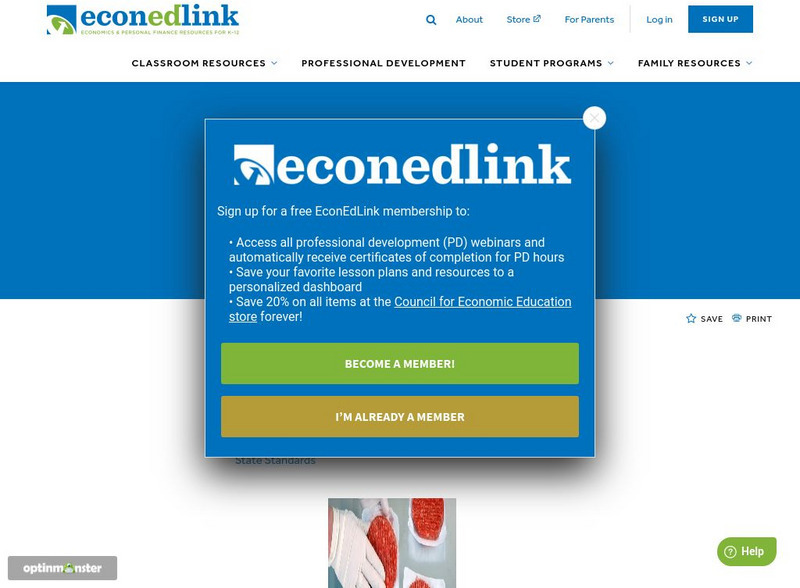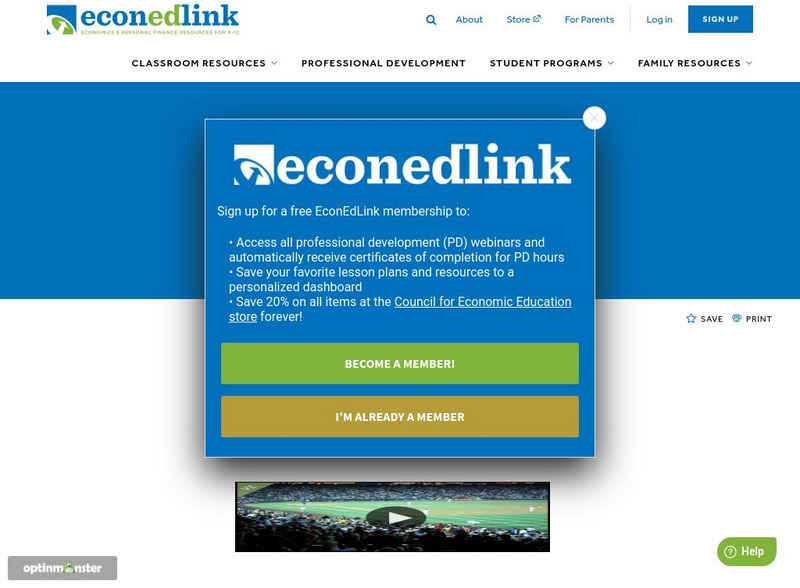Council for Economic Education
Econ Ed Link: Coming and Going: Imports and Exports Throughout the World
A lesson plan and example of imports and exports, along with related classroom activities.
Council for Economic Education
Econ Ed Link: What Do People Want to Wear?
To stay in business, fashion merchandisers must be able to anticipate what consumers want. By looking at different retail websites, students will look to anticipate what consumers are demanding. Students will then go through the market...
Council for Economic Education
Econ Ed Link: Guess Who's Coming to Dinner
This lesson introduces regulation and information as two tools used by government to promote fair competition and complete information in a market economy. Using the 1906 Pure Food and Drugs Act as a case study, students explore the...
Council for Economic Education
Econ Ed Link: The Economics of Homebuying
This lesson analyzes the costs and benefits of homeownership and asks the student to describe the factors that affect affordability, use cost-benefit analysis and knowledge of home-buying procedures to reduce the costs, analyze the...
Council for Economic Education
Econ Ed Link: Be an Energy Saver
This instructional activity focuses on the scarce and non-renewable nature of fossil fuels in order to stimulate student thinking about energy conservation. It emphasizes the fact that saving energy can be good for the wallet as well as...
Council for Economic Education
Econ Ed Link: Constitution Costs
This lesson helps students understand the basic services provided for Americans in the United States Constitution and the necessity of a system of taxation to fund those services. Students will debate the pros and cons of having...
Council for Economic Education
Econ Ed Link: Education: Weigh Your Options
Getting and keeping a job often requires special education or training. While an employer may provide or pay for some additional education or training, workers often have to obtain it on their own. For this lesson, students use a...
Council for Economic Education
Econ Ed Link: Exchange Rates and Exchange: How Money Affects Trade
Students learn how currency values are set by supply and demand, and how changes in the value of currency affect international trade. Students then find the value of the Brazilian Real in 2000 and 2002, determine whether the currency has...
Council for Economic Education
Econ Ed Link: Here's Your Chance to Make Millions in the Stock Market (Part 2)
In Part II of this lesson, students will have the opportunity to complete an interactive exercise that will take them on a historical tour of the stock market from 1920 until just after WWII. Students will learn the difference between a...
Council for Economic Education
Econ Ed Link: Here's Your Chance to Make Millions in the Stock Market (Part 3)
In Part III of this lesson, students will have the opportunity to complete an interactive exercise that will take them on a historical tour of the stock market from Post WWII through the year 2001. Students will learn the difference...
Council for Economic Education
Econ Ed Link: Income Distribution
This video teaches the concept of Income Distribution. Income distribution refers to how the total income earned ends up divided over members of the economy. The website contains an interactive quiz and links for related lesson plans.
Council for Economic Education
Econ Ed Link: It's a Matter of Power
Students examine tradeoffs and profit- maximization decisions in the case study of Kaiser Aluminum, which decided to shut down aluminum production in favor of reselling electricity.
Council for Economic Education
Econ Ed Link: Jokes, Quotations, and Cartoons in Economics
Students will apply their knowledge of economics to the analysis and interpretation of jokes, quotations, and cartoons in economics. Students will watch a Paul Solman video of an interview of Yoram Bauman, the Stand up Economist....
Council for Economic Education
Econ Ed Link: Keynes vs. Hayek: The Rise of the Chicago School of Economics
Economic freedom is freedom from government intervention in the production and distribution of goods and services. After World War II, governments were trying to rebuild their economies from the ground up. They looked to the ideas of the...
Council for Economic Education
Econ Ed Link: Money Is What Money Does
Throughout history, a wide variety of items have served as money. These include gold, silver, large stone wheels, tobacco, beer, dog teeth, porpoise teeth, cattle, metal coins, paper bills, and checks. All of these types of money should...
Council for Economic Education
Econ Ed Link: Nafta: Are Jobs Being Sucked Out of the United States?
NAFTA, the North American Free Trade Agreement, went into effect on January 1, 1994. The Agreement phases out most tariffs between the United States, Canada, and Mexico. Tariffs, which are taxes on imports, increase the price of foreign...
Council for Economic Education
Econ Ed Link: National Parks: Only You Can Prevent the Coming Crisis
What do you think of when you think of the National Parks System? Do you think of the majesty of the Grand Canyon and the redwoods of Northern California? Or does the serenity of Cape Cod and the Everglades come to mind?
Council for Economic Education
Econ Ed Link: New Sense, Inc. Vs. Fish 'Till U Drop or Coase vs. Pigou
Hot debate and arguments galore whirl around this question: "Which economic approach is the most efficient and fair to resolve utility issues surrounding the use of common or public property?" This instructional activity will explore,...
Council for Economic Education
Econ Ed Link: One Is Silver and the Other's Gold
Students learn about the money supply and that it can affect the value of money. Students investigate this in the 1896 presidential election (Bryan vs. McKinley, Free Silver vs. Gold Standard) and examine a political cartoon that depicts...
Council for Economic Education
Econ Ed Link: Production Possibilities Curve
Students will apply the concepts of scarcity, choice, and opportunity costs using a production possibilities curve. Students will interpret points inside and outside the curve. As an extension, students will see the relationship between...
Council for Economic Education
Econ Ed Link: Should Le Bron James Mow His Own Lawn?
This instructional activity will discuss absolute advantage, comparative advantage, specialization and trade with an example using professional basketball player LeBron James.
Council for Economic Education
Econ Ed Link: Specialization and the Decathlon
This lesson uses results from the 2008 Summer Olympic Games to explain that athletes specialize in sports and events for which they are most skilled for the same reasons that individuals and nations specialize in the production of goods...
Council for Economic Education
Econ Ed Link: The Big Mac Index
How fast can you say "twoallbeefpattiesspecialsaucelettucecheesepicklesonionsonasesameseedbun?" This question was asked of millions of TV viewers in the now famous 1970s McDonald's television commercial promoting the Big Mac.
Council for Economic Education
Econ Ed Link: The Collapse of Corporate Giants: The New Dr. Evils?
This lesson was inspired by an article in "Fortune" magazine, "Why Companies Fail," May 27, 2002. Its focus is on the relationship of business ethics to business bankruptcy or near failure. Students participate in a simulation by...




